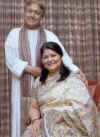|
|
the-south-asian.com January 2003 |
||||
|
JANUARY 2003 Contents Swami
Agnivesh & Music Ustad
Amjad Ali Khan Heritage
Books 'India
in Slow Motion' Serialisation
of 'Knock at every alien Events South Asian
Events in Lehngas - a limited collection Books
|
|
||||
|
Page 2 of 2 Ustad
Amjad Ali Khan
- celebrates half a century of sarod
playing (cntd.) by Rajdeep Datta
On foreign grounds, Khan is one of the most frequently
recorded Indian musicians. His concerts in the Royal Albert Hall, Carnegie
Hall, Kennedy Centre, House of Commons, Santury Hall in Japan and St. James
Palace have always been sold-out. He now owns a record label called the Bangash Music. "
There are many unrecorded compositions of mine which are not commercially
viable for record companies. So I decided to form my own company," he
says. But this is not just for the promotion of his music. "We will
also be releasing albums by other classical maestros," he is quick to
add. " But a musician has to go beyond. A good musician is
essentially a good human," he says. Which is why he has always involved
himself with charitable societies such as Spastics Societies, The Cancer
Society, The Blind Relief Fund, UNICEF and more. Not surprisingly, he is a much honoured and awarded man: A Sarod
Samrat at 15, Ustad at 25, Unesco awardee at 26, Padmashree at 30
and Kala Ratna at 32. The Padma Bhushan at 46, Unicef's National
Ambassadorship at 51, the coveted Crystal Award by World Economic Forum at
52, Honorary Doctorate, University of York at 53 as also Honorary
Citizenships of Nashville and Houston in the US. In all this, his family, he says, has devotedly stood by
him. His Assamese wife Subhalakshmi has been a great exponent of Bharatnatyam,
who gave up her career to let her husband pursue his course. ``He is a
useless husband but a wonderful human being,'' she jokes. Funds for sarod have always been forthcoming. In 1996
Amjad Ali Khan converted his nearly 300 years old ancestral house (also his
birth place) into a museum of music which is known as Sarod Ghar in
Gwalior, to preserve the ancient Indian classical musical instruments.
Besides his ancestors’ instruments to the museum he has alsocollected ancient instruments of other great masters of the
country. Certainly, in the past 50 years he has achieved what few sarod
players have. He says:" We are not sportspersons who keep a tab on the
score. We have no competition where we win or loose. I wanted to create
music with my sarod. I have achieved that." And of course, in
the process he has made the world audience sit up and listen. "Once we had only royal patrons, now we have the whole
world patronising us," he says. In the same breath he adds that, a
university degree does not qualify you to be a great master of music. " The dedication of the present breed of musicians is
less and consequently, the quality of music is suffering," he says.
Khan himself has evolved as a musician. He has been experimenting with
various musicians. " Since last year I have been composing symphonies for
the Hong Kong philharmonic orchestra. I have also composed 40 ghazals which
were penned by Gulzar. Some of these were recorded by HMV (Vaada).
Moreover, he will be performing a jugalbandi with a cello player of
the London Philharmonic orchestra. While a section of the audiences feel that fusion is just
about loud noise, thanks to the overplay of percussion, his music is
melody-oriented. Earlier, he used to play alone. " Now I have my sons to accompany me and that's a
wonderful experience. We divide our concerts into three parts, in the first
I play solo, then Amaan and Ayaan do jugalbandi, later three of us
play together." He also replies to the critics who accuse him of seeking
publicity and promoting only his sons when there are many talented sarod
players in the country. " Unfortunately, most art critics are failed
artists. I let my audience decide," he says. Make him talk of the shabda as the atma, the swara
as ishwar and he goes into a discourse. " There is no
appropriate translation of the word 'music' in Hindi," he says and
adds, " music is much more than sangeet. In Persian, music is mausiqui,
it is conversation, recitation, chanting, singing, rhythm , the best of
everything put together....." He could go on and on…. There is an air of mystery about the ustad and his
50-year-old love affair with the sarod. At 57, he looks supremely elegant in
his flowing kurtas that have become more flamboyant and chic over the
years. _________________ |
|||||
| Copyright © 2000 - 2003 [the-south-asian.com]. Intellectual Property. All rights reserved. | |||||
| Home | |||||
